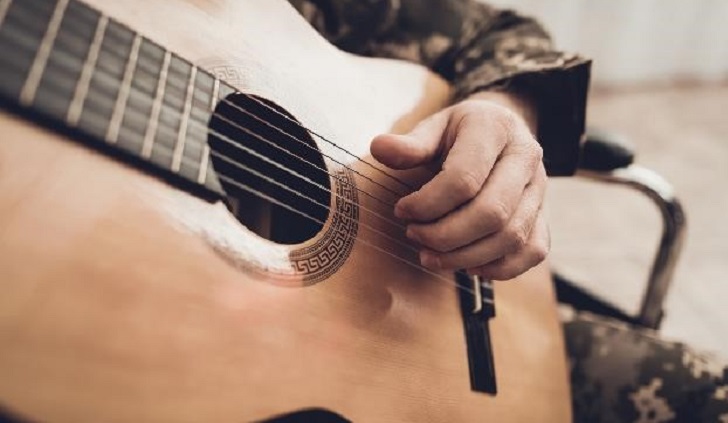Have you ever been driving to work, upset about something, and then suddenly a song you love — let’s say, “Happy” by Pharrell Williams — comes on the radio? Your mind begins to wander elsewhere, that upsetting problem fades for a moment, your body moves with the beat, and you’re transported to a much better place. We’ve all had the experience of music putting us in a better mood. However, the truth is, the power of music can be much greater. In fact, music can help Veterans cope with serious conditions.
Veterans and their families can integrate music into everyday life to help improve mood, and manage symptoms of post-traumatic stress disorder (PTSD) and other common afflictions.
Music therapy
Music therapy is the use of music as a treatment in a clinical setting. The US Department of Veterans Affairs (VA) invests in music therapy as a key treatment in helping traumatized Veterans with PTSD. Music is also beneficial for other conditions Veterans commonly face — like Parkinson’s Disease or head trauma — and it’s so successful that it’s become a preferred option for many mental health professionals.
Though the American Music Therapy Association says the therapy has been a practice since the early 19th century, it wasn’t until relatively recently that it became a prioritized form of treatment. In 2005, the VA went full-speed ahead on this approach, doubling the number of music therapists at its clinics across the country to better treat Veterans.
But music therapy in a professional setting isn’t the only way the Veteran in your life can use music’s healing powers. Integrating music into everyday life can also help. Here are a few easy ways you can set your life to music.
Access music on television
Do you or the Veteran you love like the oldies? Classical music? Jazz? You can customize the background music in your home simply by turning on your TV. Some cable providers offer a spectrum of music channels, so whatever genre you choose, you can find it (and perhaps even call on it by voice command via your remote control). You’d be amazed at how much just having the TV on in the background — playing calming tunes, instead of possible triggers like the news — can improve productivity, mood, and attitude.
Subscribe to a streaming music service
A great way to have instant and constant access to music is through a music streaming service. With most streaming apps, you can create playlists of your Veteran’s favorite tracks, plus be introduced to artists and songs that are chosen for you based on your likes and dislikes. Enter a favorite song, artist, genre, or album, and the platform can do the rest, creating a bespoke radio station just for you. It’s a great alternative to standard radio stations, which can play agitating music, commercials, and the headlines, possibly triggering unhealthy reactions.
The best part is that streaming services are accessible from your smartphone, so you can use them wherever you are — whether you’re at home, in your car, or out for walk.
Find a live and local performance
According to music therapists, the most effective music for treatment is live, wordless music. Live music provides a unique connection between listeners and musicians. Coming face-to-face with the music is rejuvenating for many people, and Veterans can greatly benefit from the calming effects of attending a live musical performance. Check your local listings for a nearby listening room, which is a space specifically designed for the music — no loud bars. All ears are focused on the sights and sounds of the performers, nurturing that connection with the listener.
Some establishments offer live music for free, so the experience doesn’t have to involve expensive tickets. Inquire with local restaurants and community about their live music schedules.
Take up an instrument
Perhaps one of the most impactful ways to experience music is to create it yourself. Take the story of Michael Trotter of soul music act The War & Treaty. Trotter is a Veteran who learned to play piano (and is now a successful musician because of it) during his time at war in Iraq. Using the piano rumored to have belonged to Saddam Hussein, Trotter found healing in his self-taught lessons. He continues to find peace and countless rewards from writing and performing his own songs. If a piano is too daunting for you or the Veteran you love, try a simpler, more mobile instrument like the ukulele. Encourage the Veteran in your life to try something new, and start small.
If you’re looking for the best way to introduce music into your Veteran’s life, start with the basics. According to music therapists, low-pitched, instrumental music can be the most soothing, while songs with lyrics can be potentially problematic. Find the sounds that work best to bring you peace of mind, and incorporate music into more aspects of your day.
Kelly Smith covers music for Xfinity. She’s a music journalist and a huge fan of therapy. Her happy place can be found in spending time with her two scruffy pups.
Topics in this story
More Stories
Soldiers' Angels volunteers provide compassion and dedication to service members, Veterans, caregivers and survivors.
Veterans are nearly three times more likely to own a franchise compared to non-Veterans.
The Social Security Administration is hoping to make applying for Supplemental Security Income (SSI) a whole lot easier, announcing it will start offering online, streamlined applications for some applicants.






